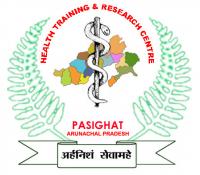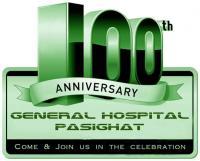My training days
By
Smti Osor Gao (Pertin)
Ex-Sister, GHP
Way back in 1958, sometime in the month of September or October, around 8-9 enthusiastic young girls came to the ADHS office, General Hospital Pasighat to face an interview for recruitment in the Auxiliary Nurse cum Midwife. I was one among them. I was also fortunate to be one of the successful candidates who had appeared from Pasighat, East Siang (then Siang) district; three of us were the local girls and another one was a Naga.
Our training as an ANM started from November 1958 for 2 years. We were the first batch of ANM from Arunachal Pradesh (then NEFA) to undergo training in the Health Training & Research Center (HTRC), Pasighat. Our batch consisted of 6 trainees: 5 from Arunachal Pradesh and 1 from Nagaland. They were: [1] Smti Oyi Tasung, [2] Smti (late) Omik Koyu & [3] myself from Siang district and [4] Smti Bengiya Mema & [5] Smti Bengiya Yaka from Lower Subansiri (then Subansiri) district of Arunachal Pradesh, whereas [6] Smti R Sakri was from Nagaland, with whom later on I shared my room during the training period.
Our hostel, situated near the present site of TB Hospital, was a double unit quarter; in one part we the trainees stayed and in another part, our Matron and Hostel Supdt, Miss Nonglite resided. She was a strict disciplinarian and a tough lady and was very particular about cleanliness. The floor of our hostel was made of wooden planks and it made sound when one walked. This infuriated our Matron staying next door. We were not supposed to make any noise while walking. Therefore, to walk softly was the first lesson we learnt. Giggling or loud noise was never allowed.
The hospital was not confined to a single location. The maternity ward was just behind our hostel and the male & female wards were near the present Kalibari area in higher region of Pasighat. The hospital was shifted to its present location during 1959-60.
We rarely had any entertainment during our training period. Ornaments of any kind were not allowed, nether long nails or cosmetics like nail polish or lipstick. It was training, studies and duties only. Visitors were not allowed to meet in the hostel, and if rarely allowed to meet, it would be only in the presence of the Hostel Supdt. Outing was a rare happening. Even if allowed, it would be in a batch of not less than four within a strict time period.
The first phase of the training taught us of a nurse’s attitude towards her patient. We were taught to bear a smiling face, to create a bond of compassion and affection, develop concern for the patient, a kind heart and patience. We were also taught to be smart, brave, simple, practical and ever ready in case of any emergency and dedicated towards our work – serving the mankind.
The first year of training was passed under the strict guidance of our respected Matron and learned doctors. Learning and practicing nursing care, dusting, bed making were a two-times-a day routine affair. Mouth washing of the serious patients, sponge bathing, use of bed pan, bed sore cases, care of the premature born babies, care of the paralytic patients checking & recording body temperature, administering injections, timely giving of medicines etc were taught to us in practical classes with great sincerity, and we with equal sincerity tried to grasp the knowledge delivered to us.
The second year training period comprised of midwifery. Let me tell you at this point that we had no senior nurses of staff nurse to guide us. The Matron, Miss Nonglite and other doctors were our guiding star. The Matron guided us in all the antenatal check-ups, conducting deliveries including forceps deliveries etc. one learned doctor, Dr Rahman, also holding the post of ADHS at that time, while conducting caesarians, episiotomies, retain placenta, placenta privia cases would teach us in details the steps involved in such cases. He used to tell us that it was very important and essential for us to learn all these because in remote / interior areas, where there were no doctors available and in cases of extreme emergencies resulting no option or alternative, we could save such patients. Understanding such responsibilities, we always, with utmost sincerity and obedience, tried to learn whatever he taught us.
It was also a part of our training duty to keep the operation theatre and all operation instruments clean and sterilized. We kept everything in the OT ready before any operation.
Our Matron was very particular about the cleanliness in the wards. It was a part of our training to clean the windows, panes, and beds and keep every thing tidy and in order. Any untidiness was never tolerated which included our personal hygiene and uniforms.
It was during this training period, we were also taught that every patient is to be given special care and attention. If a patient died, the dead patient was cleaned, dressed and handed over to the relatives with honor along with his belongings nicely packed. This made the grieved families feel that we had tried our best.
Life was so busy during these 2 years that time flew away so fast in learning, practicing and caring. When I look back today, I am contended that I opted for this noble profession and helped many in time of their sickness. In what better way can a man serve this world then serving mankind!
I am thankful to all those who had given me the knowledge of helping and caring people. I salute my Matron, Miss Nonglite and other doctors, especially Dr Rahman for all their efforts to make me proud of my nursing profession.





 This is a free homepage created with page4. Get your own on www.page4.com
This is a free homepage created with page4. Get your own on www.page4.com